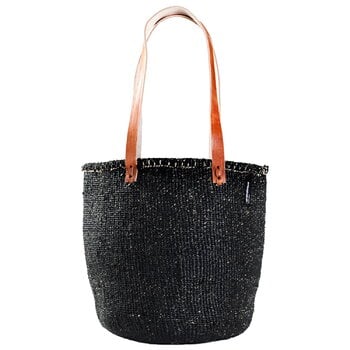Mifuko’s Kiondo shopper basket brings together traditions from across the globe: Scandinavian design and Kenyan handicraft. Made from sisal and paper, the durable shopper is perfect for carrying groceries but also works well as a summer bag for short trips or the beach, for example. The long leather handles give the shopper a lovely finishing touch and make it easy to carry on your shoulder. The beautiful and unique baskets are hand-made in Kenya, and every piece is signed by its creator.
Kiondo shopper basket, M, black
Mifuko
Description
Mifuko’s Kiondo shopper basket brings together traditions from across the globe: Scandinavian design and Kenyan handicraft. Made from sisal and paper, the durable shopper is perfect for carrying groceries but also works well as a summer bag for short trips or the beach, for example. The long leather handles give the shopper a lovely finishing touch and make it easy to carry on your shoulder. The beautiful and unique baskets are hand-made in Kenya, and every piece is signed by its creator.
Product details (6)
- Material
- Partly recycled plastic, sisal, leather
- Colour
- Black, brown
- Height
- 28 cm
- Diameter
- 30 cm
- Notes
- Leather handles length 70 cm
- Care instructions
- Baskets that are made of sisal and upcycled plastic are not afraid of a little water. You can clean them with damp cloth or rinse with water but prevent from rubbing the surface. Let dry in a warm place but not in direct sunlight.
- Product ID
Reviews (0)
Sustainability
The Product Sustainability Framework, our criteria of sustainable design, helps you find the most sustainable products in our selection. Read below which sustainability criteria this product has met.
Working conditions & labour 9/9
-
Equal opportunities for all employees
-
Commitment to UN Global Compact, fair compensation for all employees
-
Corporate responsibility requirements defined and communicated for suppliers
-
Systematic work for improved inclusion and well-being in the workplace
-
Transparent supply chain
-
Suppliers' compliance to a code of conduct ensured
-
Direct suppliers audited and certified
-
Compliance to the UN Guiding Principles on Business and Human Rights ensured in the supply chain
-
Support for community involvement in the supply chain
Eco-friendly production 8/9
-
Fair and resource-wise water-use in production
-
No incineration or landfilling of returned items
-
No use of endangered species as materials
-
No direct environmental emissions or waste (excl. GHGs) from production
-
Production and material sourcing that respect biodiversity, animal rights, and natural ecosystems
-
Material-efficient and ecological packaging
-
Positive impact on nature’s well-being through operations that regenerate natural ecosystems
-
No potentially harmful chemicals used in own production
-
The sustainability of direct suppliers' production is addressed and monitored
Climate impact 5/8
-
Company's direct greenhouse gas emissions identified and commitment to reduction
-
Product's carbon impact identified and commitment to reduction
-
Guidance on energy- and eco-efficient use of the product
-
Contribution to climate initiatives beyond the brand’s direct operations
-
Carbon footprint of the product calculated and goals set to reduce it
-
Low-carbon or compensated transportation
-
100 % renewable energy in own production and operations
-
Carbon neutral or carbon negative product
Sustainable materials 5/6
-
Sustainable and long-lasting material choices
-
No harmful or hazardous substances
-
Responsible raw material sourcing and production
-
Materials suited for circularity: monomaterials, recyclable finishings, renewable or recycled contents etc.
-
Outstanding materials in terms of innovativeness, responsibility, sustainability and circularity: local production or sourcing, 100 % recycled content, C2C-certification etc.
-
Ecological materials: natural, biodegradable, recyclable or recycled contents
Circular design 4/5
-
High aesthetic quality promoting long-term use of the product
-
Technically durable product design and material choices
-
Design for enduring life-long quality
-
Design and support for product maintenance, repair and upgradability
-
Innovative circular design solutions: circular service system, resale platform, remanufacturing, collection of used products, etc.







